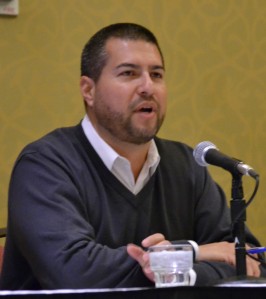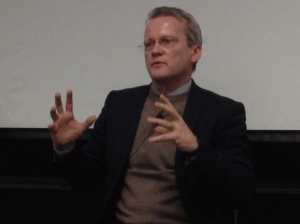After AB5: Trust, Consensus, Mutual Responsibility
The blog post below is, in a slightly extended version, cross-posted from a piece I wrote for EdSource Today. I’m grateful for the chance to reach some different readers, and now want to bring the discussion over to InterACT. With the upheaval in Chicago as a backdrop, I’m hopeful that California stakeholders and policy makers are in the mood to look for common ground with teachers. One good starting point would be to study the recommendations in the soon-to-be-released ACT report, “Promoting Quality Teaching: New Approaches to Compensation and Career Pathways” – along with the new report from the state’s Educator Excellence Task Force, “Greatness by Design.” Here are some ideas about productive approaches to teacher evaluation reform after AB5.
Last month’s legislative drama involving a teacher evaluation reform bill, Assembly Bill 5 (Fuentes) provided a snapshot of the dysfunctional politics of California education policy, with distrust and division inflaming what should be worked out in a calm and straightforward manner. Teacher evaluation improvements would be welcome by all stakeholders, but disagreements about the nature of the reform have become the unfortunate centerpiece of the discussion, pushing aside the areas of likely consensus. If the debate could be grounded in evidence, research on best practices, and areas of agreement, California could pass a bill that would actually be useful to educators and address the accountability concerns of the broader community.
First, let’s all take a deep breath. The urgency of teacher evaluation reform has been significantly overstated; high-achieving students and schools in California are not differentiated so much by their use of outstanding teacher evaluations, but rather by the powerful influences of family wealth and educational attainment, and by access to schools with more money, better staffing levels, more robust offerings, and greater stability. Even some of the strongest critics of teachers and unions concede that teachers account for a small portion of the overall factors that shape students’ lives and opportunities to learn. Teacher evaluation reform by itself is not going to bring dramatic improvements to student learning, especially if our state is unable or unwilling to invest in other supports for education and children’s well-being. Compared to other states’ educational staffing levels, California ranks at or very near the bottom in providing administrative support, counselors, nurses, and librarians, all of whom make a significant difference in schools.
At the same time, teacher evaluation is ripe for improvement. In 2010, Accomplished California Teachers published a policy report in which we detailed our desire for a robust teacher evaluation system, one that would incorporate student learning and provide ongoing feedback to support the continuous improvement of every teacher. I’ve worked on this issue for several years now, and discussed it with teacher leaders up and down the state, and I’ve yet to meet a teacher who resists the idea of using student work in an evaluation process – if it’s done in the right way, for the right reasons. In fact, the teachers who contributed to our report were thirsting for more feedback – ongoing high-quality evaluation processes focused on improving their practice.
AB 5 did contain provisions that would improve evaluations, but it did not satisfy some education reformers who want standardized test data to be integral to evaluation. Those individuals or groups who engage in particularly strident advocacy for testing will end up damaging their own cause in two ways. First, the tendency to assume the worst intentions in teachers and teacher unions merely fosters distrust. Second, by promoting the use of students’ standardized test scores in teacher evaluation, they risk creating a system worse than the one we already have.
Trust is going to be an essential ingredient in any successful reform. Advocates who take an oppositional approach to teachers will find their reforms undermined intentionally or unintentionally, not because teachers are saboteurs, but because of human nature and workplace dynamics that would translate to any sector. Teachers are looking for partners who acknowledge and want to address all of the challenges in schools and in our students’ lives; we need serious discussion rather than insulting accusations if we point out the abundant evidence that testing data will cloud rather than clarify evaluations.
In addition to building trust, evaluation reform advocates should realize that the misuse of standardized test scores will harm both student learning and teacher evaluation. The evidence is already out there. The National Research Council reviewed a decade’s worth of evidence and concluded that test-based accountability measures have not improved student learning. Narrowed curriculum and scripted classrooms have been the unfortunate offspring of No Child Left Behind and its focus on test results; adding higher stakes to such mediocre tests will further corrupt the processes we seek to improve. I’m not endorsing sabotage or cheating, but we can see it happening around the country, and it was entirelypredictable when policy makers tried to pile increasing accountability measures on the weak back of standardized tests.
We can advance the cause of quality teaching, provide for accountability, and build a solid consensus around improving teacher evaluation. It won’t be easy for some people to handle this, but the way forward is simple and clear: stop arguing about standardized testing, and focus on the substantial areas where we can agree about what matters.
Using California’s existing standaridzed in evaluations is a polarizing approach with significant practical limitations. Teachers and evaluators should instead agree upon the use of assessments selected from the regular work in the classroom, an approach that will work for every teacher rather than the minority who teach tested subjects and grade levels. Our current state tests are about to be phased out anyway, and it would be imprudent to stake major policy decisions to assessments still in development. Michael Kirst, President of the State Board of Education, estimates that we would need at least a few years’ worth of data before we could make start making much sense of the new assessment results. Common Core standards also suggest a whole-school approach to skills development, which will likely help students, but complicate attempts to link scores to individual teachers.
Stronger evaluations would offer me the direct involvement of skilled administrators and peers, with feedback from students and parents. Give me the time and resources to do as teachers in other leading nations do, spending several hours each week reviewing student work, lesson design, classroom observations and assessment results in a collaborative effort to improve outcomes. Evaluate holistically using all of these types of information, and provide the support necessary to make improvements.
If we have administrators who can’t make informed judgments about teachers by observing and participating in that kind of evaluative atmosphere, then the problem is elsewhere in the system, larger than we feared, and not redeemable by use of test scores.
But what about accountability? some might ask, imagining perhaps that Test Publishing Companies alone can provide the most important tools to identify quality teaching and keep everyone in line. Finnish education expert Pasi Sahlberg observes, “Accountability is something that is left when responsibility has been subtracted.” He helped bring Finland to world prominence in educational success without any focus on testing, or “accountability” wielded to ensure teacher compliance. My sense of accountability is inseparable from my responsibilities to my students, colleagues, school and community. I uphold my professional responsibilities daily, and would welcome any evaluation process that would help me improve continually.
Do we have education leaders in California who share my commitment to improvement? Are they willing to consider that more than a decade of heightened tension and pervasive distrust is not evidence of effective leadership? What’s often missing in this debate is the notion of reciprocity: we owe everyone our best work, and stakeholders who want our best teaching must also answer to us, be responsible for us and accountable to us. As a professional educator, I know my students and my subject, I know how to teach, and I know what I need to do a great job for each and every student. If policy makers ignore, reject, or override my professional judgment, who then is responsible for the outcomes? Accountability indeed!
Let’s strive to work together to improve the daily practices of teaching and learning, in a professional atmosphere – relying on solid research, high standards, and a sense of mutual responsibility. James Popham, professor emeritus at UCLA and an expert in all matters of assessment, wrote of teacher evaluation, “Because of the inherent particularism enveloping a teacher’s endeavors, I believe the evaluation of teaching must fundamentally rest on the professional judgment of well-trained colleagues.” Some teachers agree that fellow teachers would provide the best evaluation, and some prefer administrators. The ACT report on evaluation suggests that state policy ought to provide guidance that supports districts and schools developing “well-trained colleagues” of all types, and let them work out the details locally. One size does not fit all: a couple of smaller California districts have shown convincingly that peer evaluation can surpass traditional models by providing more frequent evaluations, better quality evaluations, a high degree of professionalism, and superior labor-management relations.
In the aftermath of AB 5 and the divisive political battles waged around it, California’s best path to successful evaluation reform is to build trust among stakeholders by focusing on evaluation practices with the strongest consensus, strongest research base, and strongest track record of success in schools nationally and internationally.
This blog post has been shared by permission from the author.
Readers wishing to comment on the content are encouraged to do so via the link to the original post.
Find the original post here:
The views expressed by the blogger are not necessarily those of NEPC.


